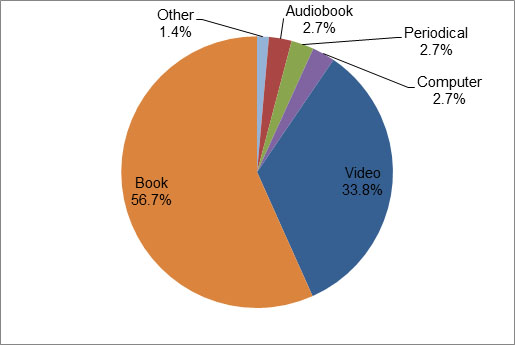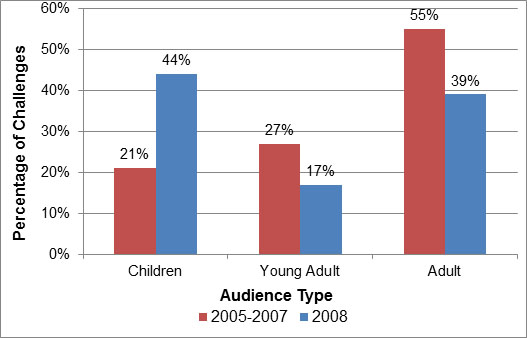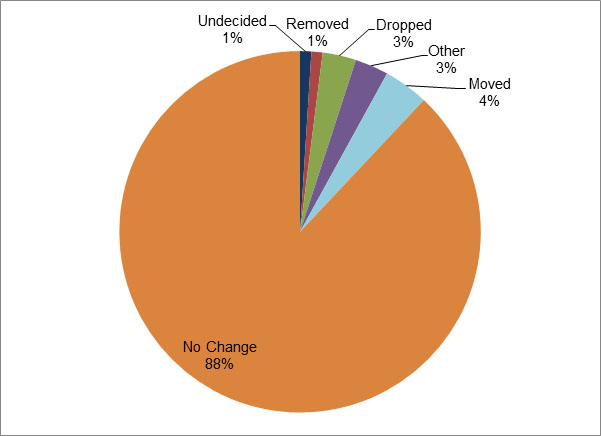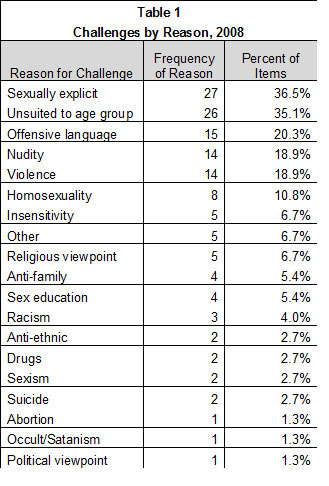Administered by the Library Research Service (LRS), the Public Library Annual Report collects information from Colorado’s public libraries. This survey collects a wide range of data, including the number of challenges to library materials, services, and the Internet. In 2008, 19 of the 115 public libraries in Colorado reported at least 1 challenge.
What is a challenge?
The American Library Association defines a challenge as “an attempt to remove or restrict materials, based upon the objections of a person or group. Challenges do not simply involve a person expressing a point of view; rather they are an attempt to remove material from the curriculum or library, thereby restricting the access of others.”
Challenges in Colorado
More than 1 out of 10 public libraries in Colorado received a challenge in 2008.
The LRS sends a follow-up survey each year to libraries that report challenges on their annual survey. This follow-up survey requests more detailed information about the challenges received, including format, title, and the reason for the challenge. In 2008, 17 of the 19 libraries that reported challenges responded to this survey. Among those libraries there were a total of 74 challenges received.
Formats Challenged
Similar to previous years, most challenges were for books (56.7%). About 1 in 3 challenges (33.8%) were for a video. The remaining challenges were for audiobooks, periodicals, the Internet, and other materials or services (see Chart 1).
Chart 1
Colorado Public Libraries, 2008
Challenges by Format

Three items received multiple challenges, all of which were children’s books. These books were Little Monkey’s Peeing Circus by Tjibbe Veldkamp (5 challenges), Uncle Bobby’s Wedding by Sarah Brannen (4 challenges), and Mommy Laid an Egg: Or, Where Do Babies Come From? by Babette Cole (2 challenges).
Most Frequently Challenged Books
Of the top 10 most frequently challenged books of 2008 reported by the American Library Association (ALA), only 1 title was challenged in Colorado: Uncle Bobby’s Wedding by Sarah Brannen. View the full list published by ALA here: http://www.ala.org/ala/issuesadvocacy/banned/frequentlychallenged/21stcenturychallenged/2008/index.cfm.
Audience
In previous years, adult materials were challenged more frequently than young adult or children’s materials. However, in 2008 children’s materials received more challenges (44%) than the other age group’s materials (see Chart 2). Adult materials made up more than a third (39%) of the challenges and 17 percent were challenges to young adult materials. In comparison with data from the previous 3 years, challenges based on audience changed substantially for each age group in 2008.
Fewer Changes in 2008
In 2008, 88 percent of challenges resulted in no change, the highest percentage since the Library Research Service began conducting the follow-up survey.
Chart 2
Colorado Public Libraries, 2008
Challenges by Audience
2008 Compared to the Previous Three Years

Actions Taken
Respondents were also asked what action was taken as a result of the challenge. In 2008 the majority of challenges (88%) resulted in no change. Four percent of the challenges resulted in moving the item, 3 percent had some other action taken, 3 percent were dropped by the challenger, 1 item (1%) was removed, and 1 challenge (1%) has not yet been resolved (see Chart 3).
Chart 3
Colorado Public Libraries, 2008
Results of Challenges

Reasons for Challenges
LRS’s follow-up survey also asked why the material was challenged. Respondents were able to designate multiple reasons. The 2 most frequently cited reasons were sexually explicit or unsuited to age group (see Table 1). These 2 reasons have been the most frequently cited reasons reported each year the follow up survey has been conducted.
New Issue in 2008
A unique type of challenge was reported on the follow-up survey in 2008. One of Colorado’s public libraries received 35 challenges regarding adult content websites. However, these challenges were different from those already discussed, as they were a request to gain access to websites already blocked by the library’s Internet filtering system. These challenges really represent a challenge to the library’s Internet policy, rather than a challenge to the library’s materials. For this reason, these challenges have been extracted from the data presented in this Fast Facts. This is the first year a challenge of this sort has been reported on the LRS follow-up survey, but if libraries continue to implement Internet filters, this may be a future issue to discuss regarding challenges.
For More Information on Challenges and Intellectual Freedom
- Visit the Colorado Association of Libraries Intellectual Freedom Committee website: http://cal-webs.org/committees6.html
- Visit the American Library Association Office of Intellectual Freedom (OIF) website: http://www.ala.org/ala/aboutala/offices/oif/index.cfm
- Visit the American Library Association OIF “Banned and Challenged Books” page: http://www.ala.org/ala/issuesadvocacy/banned/index.cfm
